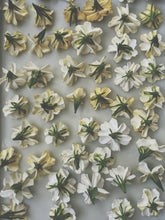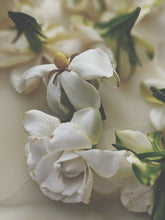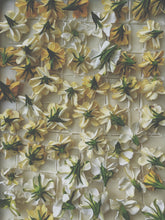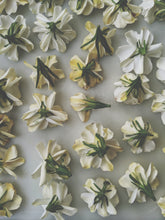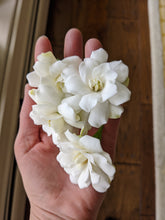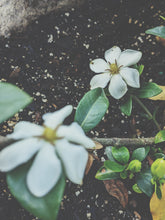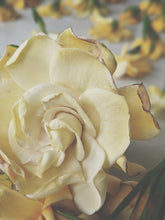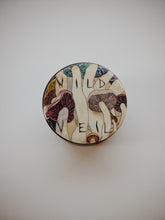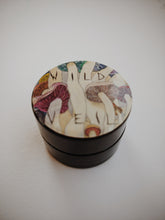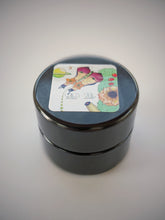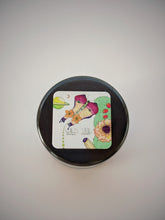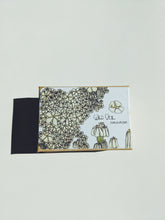
Gardenia and Australian Sandalwood Enfleurage ☽•☾ organic, whole plant perfume
☽•☾
I first fixed the enfleurage pommade with wild Australian sandalwood essential oil (Santalum spicatum from semiarid Southwest Australia). I gently worked it into organic avocado, mango and Shea nilotica butters emulsified with raw beeswax. Once I spread the base I let it harden before laying fresh gardenia flowers on it. The enfleurage was then recharged daily with my dozen gardenia jasminoides cultivars until saturated. The woodsy, green buttermilk scent of Santalum spicatum keeps the gardenia chord light and fresh. Limited quantity.
To learn more about the enfleurage process generally and at Wild Veil, please continue reading below.
Photos: enfleurage pommade with fresh flowers and my gardenias in bloom, enfleurage in 5ml and 10ml black violet glass jars.
☽•☾
Wild Veil's Gardenia Enfleurage:
Each day fresh blossoms are culled and laid on the pommade (plant based fats and waxes), and spent blossoms are removed. This ancient technique is the only method of scent extraction that captures the entire arc of a flower's headspace, from opening to last breath. Other technologies: tincture, steam distillation, and supercritical co2 extraction freeze and capture but a moment in a flower's aromatic evolution. Only enfleurage records the full expression of fragrance, with all the nuances from immaturity to maturity. Sometimes the old ways are best.
Wild Veil is dedicated to enfleurage, and my gardenia enfleurage is a deep and powerful way to commune with the flower, with 14 varieties from my gardens contributing their distinct aromas. The result is an organic gardenia solid perfume-- a rarity. Its scent is indulgent, deep, creamy, and languorous, the olfactory equivalent of a southern drawl. Something more than the sum of jasmine, star jasmine, tuberose, and lily. Enfleurage brings out the nuanced wintergreen and pine back notes of this thick white custard of a flower.
Gardenia jasminoides: all the same species but each cultivar smells distinct, and each one goes through an incredible scent arc from bud to bloom. To name a few:
Aimee Yoshioka’s enormous flowers announce their fragrant presence before you see them. Its quilted white petals are the scent of heaven on earth. The Double Mint is a little lemony and fresh butter, like lemon curd, upon opening, then takes on a fruity peach-jasmine scent that lasts until a pungent musk emerges in its final days. August Beauty is a ripe mango that strangely gets fresher before acquiring a green mushroom odor at last. Daisy opens buttery with some of the richness of champa, expiring in mushroomy indole death. Crown Jewel is a pineapple burst, a hint of apricot patchouli typical of osmanthus. And Tea has a loamy crimini profile undercutting its grand sweet nectar.
In my enfleurage I select fresh blossoms in all the stages of bloom so the pommade will memorialize this flower’s complexity. Each day (sometimes twice a day) I check each flower resting on the fat to make sure it is still moving aromatically. A flower will last on the fat for anywhere from 1 to 5 days. There’s a lot of indolic musk in this product, so be forewarned!
Literally, "in flower," enfleurage is a traditional, labor intensive, and pure method of extracting fragrance, utilizing only fat and plant material. Enfleurage is also the method of perfume extraction that most closely replicates the odor profile of the original flower: each flower's complex fragrant arc from bud to bloom is imprinted in fat, where it is stored. The scent is true to the blossom, but subtle, requiring you to bend in close for a sniff.
When I smell gardenia, I feel medicated, hypnotized, lulled. The world slows down and I am "into" the flower as with no other. I have used enfleurage to capture gardenia's enveloping, exotic aroma. Enfleurage produces a "pommade," which is a highly scented solid perfume and not to be confused with pomade for hair! This pommade consists of hundreds of individual organic gardenia blossoms that I gathered from my perfume gardens, laid onto an emulsion of waxy fat. They are left to breathe on the fat through their fragrant lifespan, then removed, washed, and dried. I repeat this process to reach a high degree of fragrance saturation. Each reposition is a "charge," and this enfleurage was charged the traditional 36 times. The aroma is thick, tropical, and southern. It is very much the opposite of the shrill, overpowering version of a synthetic floral you find at the fragrance counter. Only you and those closest to you will be able to smell it. Apply to pulse points.
PLEASE READ:
**Although the floral perfume produced by enfleurage is osmically balanced (meaning it contains sufficiently complex interplay of top through base notes to be considered a perfume in itself), it is a subtle creation. It must be given time to breathe on the skin. When cold, it may not smell much at all. Allow it to breathe and warm on a pulse point before inhaling deeply. Most noses love the aroma of my enfleurage but, a small percent of my clients are anosmic to enfleurage and therefore cannot smell the floral fragrance. This has to do with natural differences in nasal receptors and is not due to an issue with the product. I always recommend ordering a sample before committing to a larger size for this reason.**
A B O U T • W I L D • V E I L • E N F L E U R A G E
Enfleurage is a beautiful process whereby odorless fats that are solid at room temperature are used to capture the fragrant compounds exuded by plants. Enfleurage is by far one of the oldest methods of fragrance extraction, and it is nearly extinct. Only a handful of artisans still practice it today as it is no longer used in the manufacture of perfumes on a mass scale. A voluptuous art, enfleurage is quite the labor of love, consuming time, labor, and expense. Historically enfleurage was done by women, or maidens, in the fields of Grasse, France. Although far rarer to find enfleurage products in the market today, is still "largely" practiced by women.
There are two types of enfleurage: "cold" and "hot." Wild Veil exclusively uses cold enfleurage:
In cold enfleurage, a large framed plate of glass, called a chassis, is smeared with a layer of fat, traditionally unscented animal fat rendered from lard or tallow, and allowed to set. My enfleurage products are organic and botanical; I purvey fats from a variety of nut and plant butters such as shea, jojoba, avocado, fair trade palm, and mango. Botanical matter, usually petals or whole flowers, is then placed on the fat and its scent is allowed to diffuse into the fat over the course of 1-3 days. The process is then repeated (up to 36 times depending on the fat and the botanical matter) by replacing the spent botanicals with fresh ones until the fat has reached a desired degree of fragrance saturation. The cold fat process was developed in southern France in the 18th century for the production of high-grade concentrates.
In hot enfleurage, solid fats are heated and botanical matter is stirred into the fat. Spent botanicals are repeatedly strained from the fat and replaced with fresh material until the fat is saturated with fragrance. This method is considered the oldest known procedure for preserving plant fragrance substances. So far Wild Veil only incorporates cold enfleurage into products.
In both instances, once the fat is saturated with fragrance, it is then called the "enfleurage pommade." This is a highly perfumed solid fat, not to be confused with pomade used for styling hair. Historically, this enfleurage pommade was either sold as it was,* or it could be further washed or soaked in ethyl alcohol to draw the fragrant molecules into the alcohol. When the alcohol was separated from the fat and allowed to evaporate, it would leave behind the absolute of the botanical matter. The spent fat would typically be used to make soaps since it is still fairly fragrant. *This listing is for an organic pommade.
The advent of modern perfumery ushered in the ease and relative inexpense of commercial solvent-based extraction of natural materials along with mass production of synthetic compounds, making the art of enfleurage seem highly inefficient and costly in comparison. The method is now superseded by more efficient techniques such as solvent extraction or supercritical fluid extraction using liquid carbon dioxide (CO2) or similar compressed gases. Enfleurage had been the sole method of extracting the fragrant compounds (containing thousands of aromachemicals) from delicate floral botanical such as jasmine and tuberose, which are be destroyed or denatured by the high temperatures required by cheaper methods of fragrance extraction such as steam distillation. It is still believed by some perfumers that enfleurage remains the only way to capture and preserve the full range of complexity of certain scents, particularly of flowers.
s i z i n g ☽•☾
I offer enfleurage in sizes of 1ml (a sample of approximately 20-25 drops), 5ml and 10ml. 1ml (sample size) comes in a hinge top pod. 5ml comes in a glass jar. 10ml is available in a glass jar or a round tin.
Please make your selection from the menu.
r a w ☽•☾ m a t t e r
Wild Veil natural perfumes are composed by me, Abby, using homemade, wildcrafted and organic aromatics in Vermont. These include my handmade enfleurage, tinctures, enfleurage extraits, absolutes, resinoids and concretes, and floral waxes. I spend as much time growing plants and foraging as I do composing perfumes.
h o w ☽•☾ t o ☽•☾ w e a r
The best way to experience a natural perfume is to apply it to well-moisturized skin, without rubbing in (absorption only shortens the wear time of fragrance) and without scrubbing off. Natural perfumes are dynamic and take a minimum of 2 hours to reach their final stage, or dry down. Enjoy the alchemical changes as they unfold from the initial intensity of top notes, to the warmth of the heart, to the depth of lower base notes.
☽•☾ Wild Veil ☽•☾ alchemy between earth and ether ☽•☾
☽•☾ All aesthetic material copyright Abby Hinsman 2019 ☽•☾











